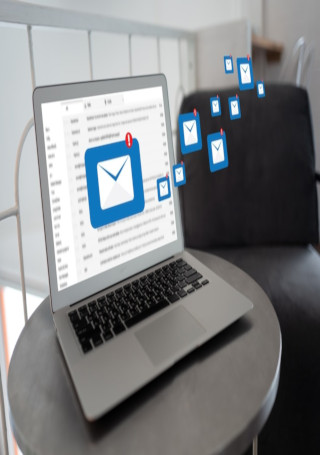Do you ever feel like the sole non-user of email? You do not need to feel excluded. With a little effort, you will discover that email is simple to…
continue readingHowever, in the case that a candidate fits the job description, then an interview is scheduled. When the employer reaches you through an email, it’s only fair to write an interview acceptance email back. By doing so, it leaves a positive impression on the recruitment team of the company. The article provides details about interview acceptance emails and creates a suitable letter to show appreciation.
7+ Sample Interview Acceptance Emails
-
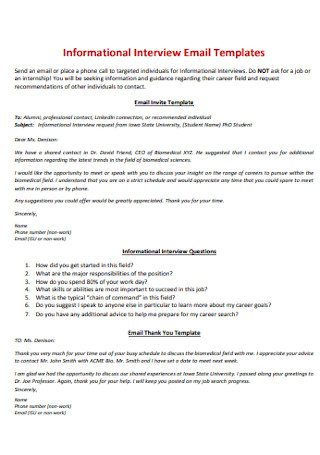
Informational Interview Acceptance Email
download now -
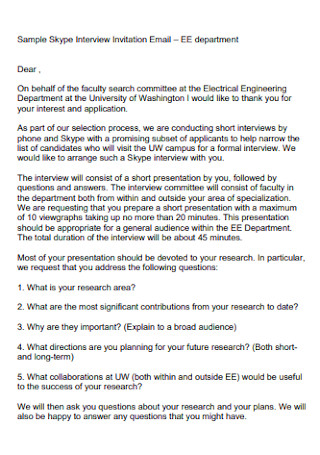
Skype Interview Invitation Acceptance Email
download now -
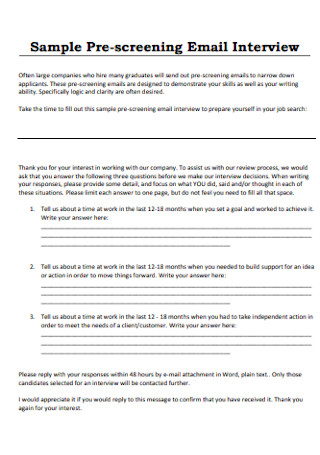
Sample Pre-screening Email Interview
download now -
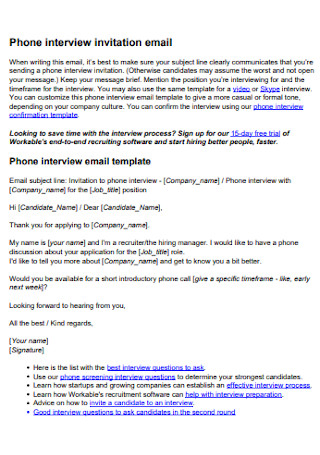
Phone Interview Invitation Email
download now -
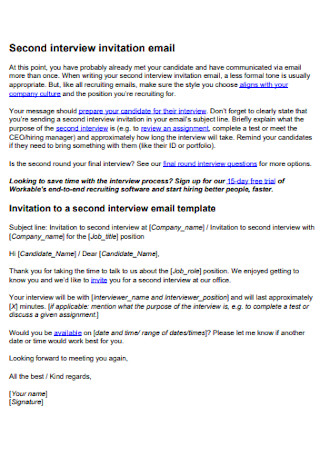
Second Interview Invitation Email
download now -
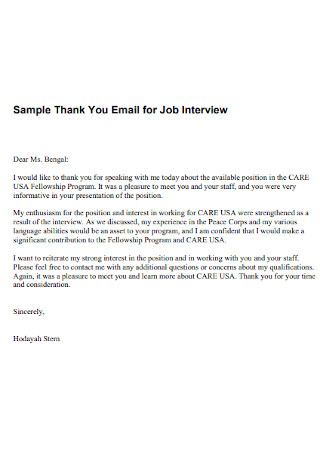
Sample Thank You Email for Job Interview
download now -
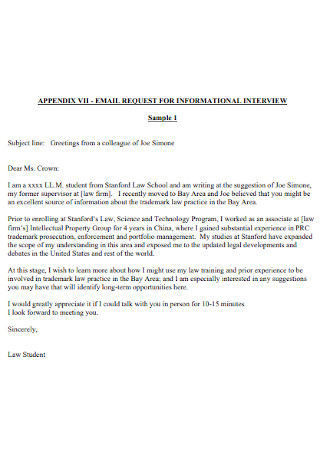
Email Request for Informational Interview
download now
What Is an Interview Acceptance Email?
An interview acceptance email is similar to an interview acceptance letter. Its purpose is to accept and confirm the interview arrangements. Despite being contacted through a phone call by the company’s recruiter, it is encouraged to write an email. Writing an interview acceptance letter assures the employer you are actively seeking to communicate with them and show interest in the position. It helps the employer understand how much getting the call for an interview impacts you as a potential employee. Communication establishes a rapport between a potential employer and a candidate.
According to Jobvite’s database dated 2017, an average of 1 out of 6 applicants gets interviewed for a job. That’s a less than 20% chance of being offered an interview. From the data, a little note of thanks can go a long way in showing the employer that you are grateful for the opportunity to be interviewed.
Parts of an Interview Acceptance Email
After getting an email or a phone call from a potential employer, it is relevant to respond with an email saying appreciation for reaching out to you. Here are the things to include in your interview acceptance email.
Proofreading your letter and sending a copy to yourself are recommended as well. It helps you see if there are inaccuracies in your writing that can be corrected and addressed.
Steps In Responding to an Email Interview Invitation
It is necessary to know when to send an interview acceptance email. Ideally, once you received an email about a job interview, it is advisable to respond within 24 hours to ensure the employer you are still interested in and available. Here are steps to remember when responding to an interview email.
Step 1: Respond to the Email as Soon as Possible
It is ideal to respond immediately to the email as the acceptance letter does not take a long time to create. In addressing the approval letter of the interview, it is fitting to provide a reply within a day of the acceptance date. It sends a message to the recruiter that the applicant is waiting for the interview date and are eager to be a part of the company.
Step 2: Indicate Acknowledgement and Receipt of the Letter
Begin the email by acknowledging the receipt of the interview invitation by the sender. In the acknowledgment, it is essential to indicate the job title and the name of the applicant. It means the letter reached the correct person, and there are no issues faced. It shows respect and gratitude to the hiring manager of the company for reaching out to the candidate.
Step 3: Describe How You Feel
Express your appreciation for the opportunity given by the recruiter. It displays the candidate’s professionalism and gives the impression that the company executed the right decision in reaching out. In describing gratitude, make sure to state words or phrases that show promise relating to performance. Recruiters are pleased to hear the appreciation for their efforts in selecting the best candidates. It helps alleviate any doubts about the candidate’s abilities to perform their jobs.
Step 4: Keep the Content Simple and Short
Refrain from using long paragraphs or highfalutin words if simpler terms are available for use. The message must be clear and thorough, expressing thanks and appreciation for the opportunity given by the company. If there are questions or clarifications to be raised to the recruiter, include them. Do not include repetitive thank you notes across the letter and only state thanks in the introduction and the conclusion.
Step 5: Use a Warm and Professional Tone in Writing a Response
Keeping it short and simple does not mean the content is stoic and bland. It helps to have the tone of the letter friendly and professional. In this sense, your response is well structured and appropriate.
FAQs
What are the things to keep in mind when doing a job interview?
Due to the circumstances the world is facing right now, candidates have the chance to be interviewed over video conferencing. However, keep in mind that these interviews go the same way as traditional interviews. Preparing for the interview is still essential to land the position. Here are tips to keep in mind to secure the job application interview process.
- Research about the company: It is essential to research the company, along with its vision, mission, and current conditions. It is also advisable to raise questions about the company’s culture and environment.
- Familiarize yourself with your resume: The resume serves as a blueprint for the candidate. The candidate must possess knowledge in all parts of the resume. It is necessary to speak to the best of your ability to show your capabilities and skills to secure the position.
- Analyze the job description: Knowing the job description give the recruiter an idea that the candidate has read and understood the functions required from the employee. It helps the applicant to navigate and tailor the words used to fit the vacant position.
- Plan an elevator pitch: An elevator pitch in the best response to the interviewer asking, “Tell me about yourself.”. It must include a story that inspired you to take on the position. List previous situations where you showed passion in the field. Highlight the skills relevant to the job description posted by the company.
- Share previous experiences related to the job: In sharing previous experiences, remember to state the situation clearly, describe the responsibilities related to the task, share the actions you did to alleviate the crisis, and discuss the results after the necessary action.
- Create a strong impression: It is necessary to build a rapport with the person conducting the interview. It helps to project enthusiasm and energy. It is also important to dress professionally.
- Respond to small talk: It benefits the candidate to identify topics of shared interest. In the acceptance letter, it is necessary to ask about the interviewer’s information. Researching about current trends or events related to the company is helpful because it shows the interviewer your investment to know the company is fairing.
- Be aware of your body language: Body language greatly reflects a candidate’s confidence, nervousness, or uncertainty. It is advisable to prepare yourself and exude positive energy. Mind your posture and give importance to movements showing focus and attention.
- Don’t be afraid to ask questions: Perhaps one of the most important aspects of any job interview relies heavily on the candidate asking questions. Through asking questions, the interviewer not only sees the determination of the applicant to join the company. The candidate also learns more about the company by asking the right questions about career development opportunities, future projects, or employee relations.
- Write a follow-up letter: Do not forget to write a letter of appreciation to the interviewer for the time to meet with you. The content must focus on relevant details about the interview and express excitement about the possibility of working with the company.
How does a potential candidate land a job interview?
Most employers post vacancies through job search portals and use social media to market ads that people see to get traffic. Recruiters also ask for employee referrals to fill in the openings. Jobs require a well-written resume and cover letter, and in some cases, a work portfolio. The human resource department also initiates cold-calling from candidate referrals, asking if they are interested in a particular position, even if it is for nonvacant and future posts. It is also advisable for applicants to persist and follow up on job applications.
What are the clues that hint an applicant claims a vacant position in a job interview?
Remember to look for indicators if you are eager to land the job even before an interview. These indicators can be signs that the recruitment process is going your way. Take note that these indicators do not guarantee getting the job. How you respond to the entire interview is still the most valuable aspect. Here are some indicators or signs to look for if you’re curious about getting the job.
- The recruiter uses ‘when’ instead of ’if’.
- The recruiter repeats that they like what they hear.
- Discuss perks and negotiate salary expectations.
- Introduction of the follow-up process.
- The conversation becomes casual.
What should the job applicant do after an interview?
It is advisable to ask what the next process is, how many candidates are applying for a similar position and an estimate of when to expect a follow-up. It’s a long time to wait for a call. It is recommended you keep your lines of communication open. It also doesn’t hurt to apply for jobs as you wait because it will give you plenty of opportunities to land a job. It is also helpful to ask for details about the recruiter or the human resource manager to send thank you letters. Patience and perseverance are the keys to success.
There are many opportunities for you to land a job interview. In this day and age, there are prerequisite conditions for specific jobs. Some require a degree or previous job experience to qualify for a particular position. With patience and perseverance, along with the ability to research and study about a job, the chances of getting that job interview are high. Make sure that you are keen on the job position and the company because of the culture and vision. It is important to show appreciation for the opportunity of time and trust given by the interviewer. In the words of Voltaire, “Appreciation is a wonderful thing. It makes what is excellent in others belong to us as well.”. Remember to send a quick interview acceptance email to your recruiter and show your gratitude.
